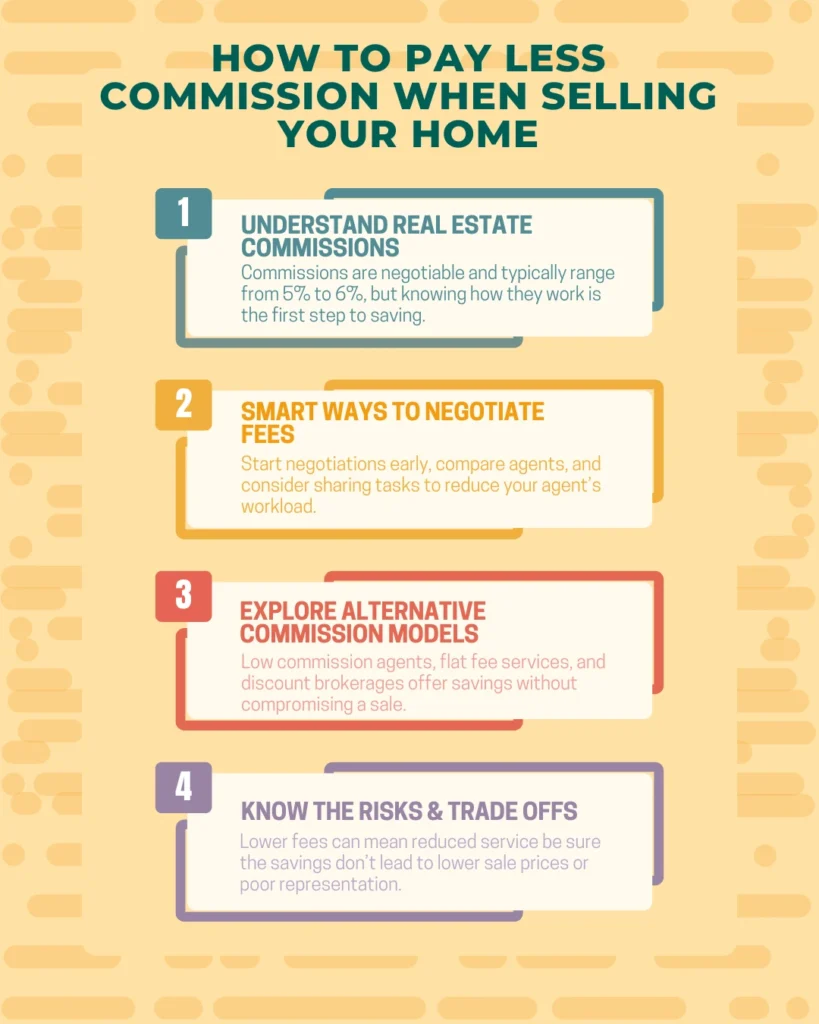How to Pay Less Commission When Selling Your Home


When it comes time to sell your home, one of the major costs to consider is the commission paid to the real estate agents. Realtor commissions typically range from 5% to 6% of the final sale price, which can be a significant expense. In some cases, this commission fee can be as high as $30,000 for a $500,000 home. The good news is that these fees are not set in stone. With a little research and negotiation, you can learn how to pay less commission and keep more money in your pocket.
This article will guide you on how to pay less commission when selling your home, covering everything from understanding what commission entails, how you can negotiate lower rates, and alternative commission structures. Let’s dive in.
Table of Contents
ToggleReal estate commission refers to the fee paid to real estate agents for their services in helping you buy or sell a property. Typically, the commission is paid as a percentage of the home’s sale price and is split between the seller’s agent (listing agent) and the buyer’s agent. In many cases, the seller pays the entire commission, which is typically between 5% and 6%.
For example, if you sell your home for $500,000 with a 5% commission, you will pay $25,000 in commission fees often split between the two agents involved. These fees cover the agent’s services, including marketing the property, negotiating offers, coordinating showings, and handling paperwork.
However, not all commissions are fixed, and there’s plenty of room for negotiation. Understanding how commission works is the first step in learning how to pay less commission effectively.
Yes, real estate commission fees are negotiable. Many sellers do not realize this and simply accept the standard commission rates. However, there’s no legal requirement for real estate agents to charge the typical 5% to 6% commission. Instead, the rate is up to the seller and their agent to agree upon.
Negotiating your realtor’s commission is especially important if you’re selling a high value property, have experience with selling homes, or are in a buyer’s market. If you’re wondering how to pay less commission without compromising service, starting the conversation early with your agent is key.
Several factors can influence the commission rate an agent will charge, and understanding these factors will help you negotiate a better deal.
There are alternatives to the traditional commission model that can help you save money when selling your home. If you’re exploring how to pay less commission, these models are worth considering:
Low Commission Realtors: These agents offer services for as low as 1% to 2%. This is one of the most common strategies when researching how to pay less commission while still getting professional help.
Flat Fee Realtors: Flat fee models charge a set amount, regardless of your sale price. If your goal is how to pay less commission, this option provides clear cost expectations.
Discount Brokerages: These brokerages offer reduced services at reduced rates. For those who prioritize saving money, it’s another practical route in your journey of learning how to pay less commission.
The best time to negotiate is when choosing your listing agent. If you’re serious about how to pay less commission, don’t wait until you’re locked into a contract. Be upfront about your expectations.
Other good times include:
After Receiving an Offer: Once a deal is on the table, your agent may agree to lower their commission to close the sale.
Contract Renewal: If your property hasn’t sold yet, you can renegotiate before renewing the listing. This could be your second chance to focus on how to pay less commission.
To successfully negotiate, follow these tips:
Shop Around: Interview multiple agents and compare rates. Understanding your local market is crucial to mastering how to pay less commission.
Evaluate Services: Make sure you’re still getting essential services even if the commission is lower.
Offer to Reduce Workload: Doing tasks like staging, marketing, or photography yourself could give you more leverage in lowering fees.
Be Reasonable: Asking for modest reductions while showing your willingness to cooperate helps both sides win. Remember, part of how to pay less commission involves being fair in your expectations.
While lowering your fees can be beneficial, there are risks:
Reduced Service: Some low commission agents may not offer full service support. If you’re aiming to understand how to pay less commission, ensure it doesn’t come at the expense of effectiveness.
Dual Agency Conflicts: A single agent representing both sides might not negotiate as aggressively on your behalf.
Lower Sale Price: Less experienced agents may not market the home well, leading to fewer offers and possibly a lower final price.
Learning how to pay less commission is all about preparation, knowledge, and timing. Whether you go with a flat fee agent, negotiate with a traditional realtor, or use a discount brokerage, the goal is to save money without sacrificing quality service.
By researching your options, evaluating different commission models, and having open conversations with agents, you can confidently make decisions that align with your goals. Ultimately, how to pay less commission is about being a smart seller one who gets top dollar for their property while keeping more of that money in their own pocket.